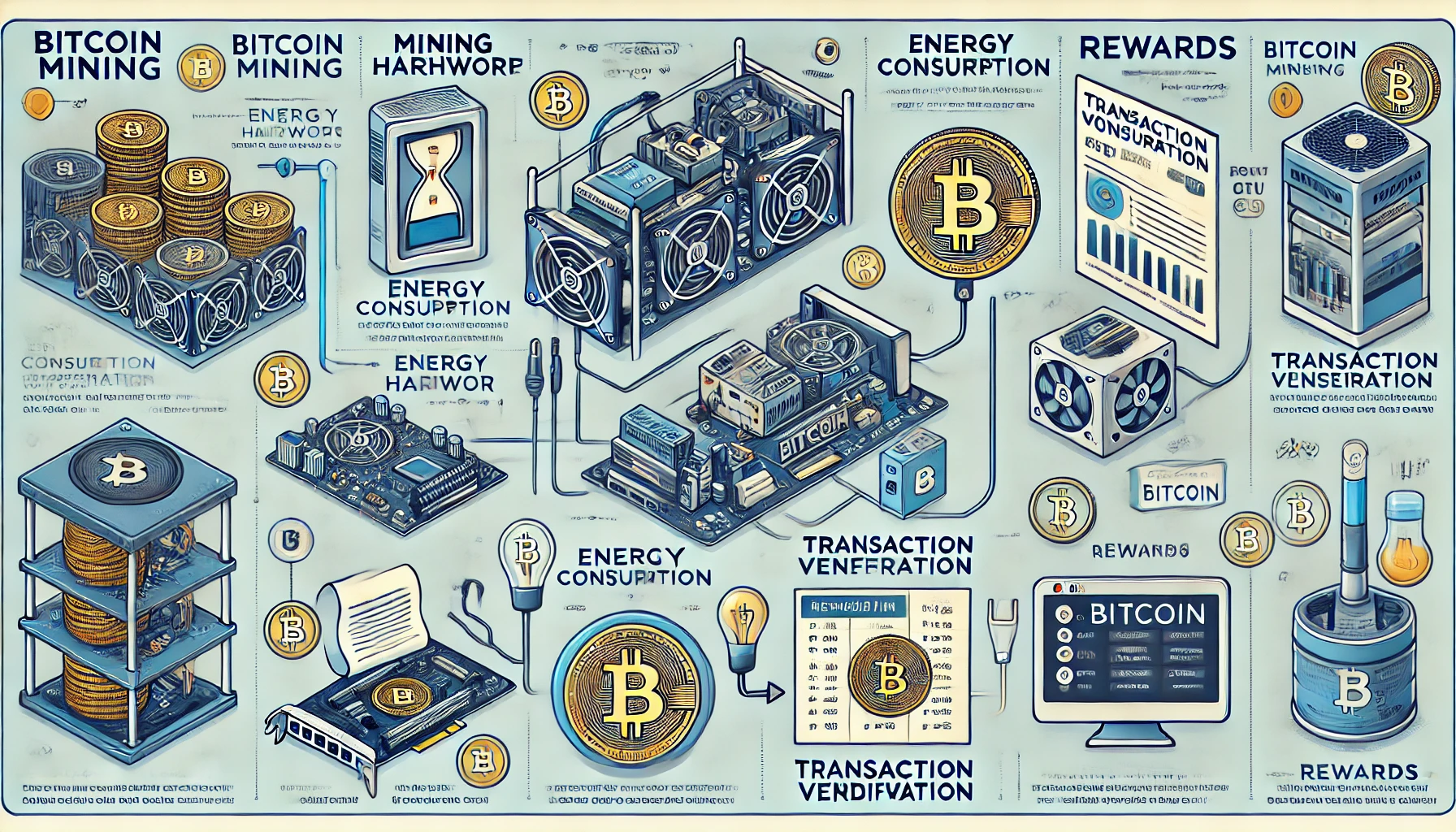What is Bitcoin Mining?
Bitcoin mining is the process by which new bitcoins are introduced into circulation, and transactions are verified and added to the public ledger, known as the blockchain. It involves solving complex computational puzzles using specialized hardware, a process that ensures the security and integrity of the blockchain. This decentralized process not only mints new bitcoins but also maintains the ledger’s accuracy and prevents double-spending. Mining is a crucial aspect of Bitcoin’s decentralized network, maintaining its trustworthiness and reliability without a central authority.
Background
Bitcoin mining is fundamental to the functioning of the Bitcoin network. When Bitcoin was introduced by the pseudonymous Satoshi Nakamoto in 2008, mining was intended as a means to distribute new coins fairly and incentivize individuals to contribute their computing power to the network. This method ensures that the network remains secure and that the decentralized ledger remains accurate and immutable.
Origin/History
Bitcoin mining began in 2009 when Bitcoin’s pseudonymous creator, Satoshi Nakamoto, mined the first block, known as the Genesis Block. Initially, mining was accessible to anyone with a basic computer. Over time, as more people started mining, the difficulty of solving these mathematical puzzles increased, leading to the development of specialized Bitcoin mining machines and the rise of professional mining farms.
| Year | Milestone | Description |
|---|---|---|
| 2009 | Genesis Block | First Bitcoin block mined by Satoshi Nakamoto |
| 2011 | Mining Pools | Emergence of mining pools to share resources |
| 2013 | ASIC Miners | Introduction of specialized mining hardware |
| 2017 | Mining Farms | Large-scale operations dominate the mining scene |
Types of Bitcoin Mining
There are various types, each suited to different scales of operation and investment levels.
- Solo Mining: Solo mining involves an individual miner attempting to validate blocks on their own. While it can be profitable, it often requires significant investment in hardware and electricity.
- Pool Mining: Pool mining allows miners to pool their resources and share computational power, distributing rewards among participants based on their contribution. This approach helps miners achieve more consistent returns and mitigates the risks associated with solo mining.
- Cloud Mining: Cloud mining enables users to lease mining hardware hosted in remote data centers. It offers a hassle-free mining experience, eliminating the need for physical equipment. Cloud mining companies typically charge a fee for their services and manage the hardware on behalf of the users.
How Bitcoin Mining Works
It works by using specialized hardware, known as Bitcoin mining machines, to solve cryptographic puzzles. Miners compete to solve a block, and the first to do so gets to add the block to the blockchain and receives a reward, currently 6.25 bitcoins. This process involves three main steps:
- Transaction Verification: Miners verify the legitimacy of Bitcoin transactions.
- Block Creation: Verified transactions are grouped into a block.
- Proof of Work: Miners solve a complex mathematical puzzle to add the block to the blockchain.
Pros and Cons
Bitcoin mining has several advantages and disadvantages, which are crucial for potential miners to consider.
| Pros | Cons |
|---|---|
| Financial Incentives | High Energy Consumption |
| Security of the Bitcoin Network | Increasing Difficulty and Competition |
| Decentralization of Currency | High Initial Investment in Equipment |
| Potential for High Returns | Legal and Regulatory Uncertainties |
Major Bitcoin Mining Companies
Several companies have become key players in the industry, offering advanced mining hardware and large-scale mining operations.
- Bitmain
- Bitmain is a leading manufacturer of ASIC mining hardware.
- Canaan Creative
- Canaan Creative is known for its Avalon series of Bitcoin miners.
- Marathon Digital Holdings
- Marathon Digital Holdings is one of the largest companies in North America.
Examples and Applications
Bitcoin mining has evolved beyond individual efforts to become a significant industry with various applications and examples.
Applications
- Financial Inclusion: It ensures secure and efficient validation of financial transactions on the blockchain. This application is fundamental to the operation of the Bitcoin network, as it guarantees that transactions are processed without the need for a central authority.
- Blockchain Security: Mining contributes to the overall security of the blockchain. By solving complex mathematical puzzles, miners make it extremely difficult for malicious actors to alter the blockchain, thereby ensuring the integrity and immutability of the ledger.
- Cryptocurrency Market: It supports the broader cryptocurrency market by maintaining the Bitcoin network’s reliability and trustworthiness. This, in turn, encourages the adoption and acceptance of Bitcoin and other cryptocurrencies as legitimate forms of digital currency.
Real-World Examples
- Genesis Mining: One of the largest cloud mining companies, offering mining contracts for various cryptocurrencies.
- Antpool: A major Bitcoin mining pool operated by Bitmain.
- Hut 8 Mining Corp: A Canadian mining company known for its extensive operations.
References
- Investopedia. (n.d.). How does Bitcoin mining work?
- Coinbase. (n.d.). What is mining?
- CoinDesk. (n.d.). Bitcoin mining.
- Fidelity. (n.d.). What is mining?

